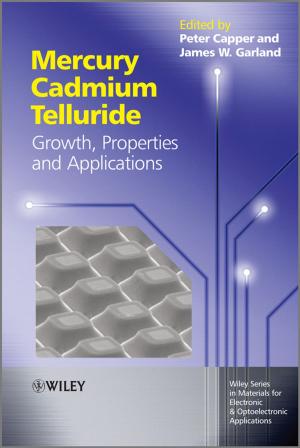Hydrogen Generation, Storage and Utilization
Nonfiction, Science & Nature, Science, Physics, Mechanics| Author: | Jin Zhong Zhang, Jinghong Li, Yat Li, Yiping Zhao | ISBN: | 9781118875179 |
| Publisher: | Wiley | Publication: | April 2, 2014 |
| Imprint: | Wiley | Language: | English |
| Author: | Jin Zhong Zhang, Jinghong Li, Yat Li, Yiping Zhao |
| ISBN: | 9781118875179 |
| Publisher: | Wiley |
| Publication: | April 2, 2014 |
| Imprint: | Wiley |
| Language: | English |
The potential use of hydrogen as a clean and renewable fuel resource has generated significant attention in recent years, especially given the rapidly increasing demand for energy sources and the dwindling availability of fossil fuels. Hydrogen is an “ideal fuel” in several ways. Its only byproduct of consumption is water; it is the most abundant element in the universe; and it is available at low cost. Hydrogen generation is possible via a number of possible chemical processes, to separate the hydrogen from its bond with atoms such as carbon, nitrogen, and oxygen.
In this book, the authors provide the scientific foundations for established and innovative methods of hydrogen extraction; outline solutions for its storage; and illustrate its applications in the fields of petroleum, chemical, metallurgical, physics, and manufacturing.
- Addresses the three fundamental aspects of hydrogen as a fuel resource: generation, storage, and utilization
- Provides theoretical basis for the chemical processes required for hydrogen generation, including solar, photoelectrochemical, thermochemical, and fermentation methods
- Discusses storage of hydrogen based on metal hydrides, hydrocarbons, high pressure compression, and cryogenics
- Examines the applications of hydrogen utilization in the fields of petroleum, chemical, metallurgical, physics, and manufacturing
- Contains over 90 figures, including 27 color figures
The potential use of hydrogen as a clean and renewable fuel resource has generated significant attention in recent years, especially given the rapidly increasing demand for energy sources and the dwindling availability of fossil fuels. Hydrogen is an “ideal fuel” in several ways. Its only byproduct of consumption is water; it is the most abundant element in the universe; and it is available at low cost. Hydrogen generation is possible via a number of possible chemical processes, to separate the hydrogen from its bond with atoms such as carbon, nitrogen, and oxygen.
In this book, the authors provide the scientific foundations for established and innovative methods of hydrogen extraction; outline solutions for its storage; and illustrate its applications in the fields of petroleum, chemical, metallurgical, physics, and manufacturing.
- Addresses the three fundamental aspects of hydrogen as a fuel resource: generation, storage, and utilization
- Provides theoretical basis for the chemical processes required for hydrogen generation, including solar, photoelectrochemical, thermochemical, and fermentation methods
- Discusses storage of hydrogen based on metal hydrides, hydrocarbons, high pressure compression, and cryogenics
- Examines the applications of hydrogen utilization in the fields of petroleum, chemical, metallurgical, physics, and manufacturing
- Contains over 90 figures, including 27 color figures















